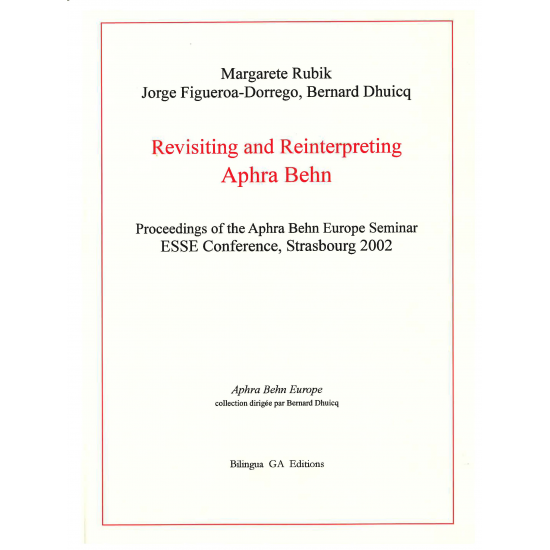The ESSE Conference held in Strasbourg in August 2002 was the venue for this second European symposium on Aphra Behn after the first one convened in Paris in July 1999. As its title indicates, it was the occasion for specialists to revisit and reinterpret the works and thoughts of the first English professional female writer to whom Europe and the world was a stage. It also provided an opportunity for the editors of these proceedings to include papers delivered in other climes.
- Maureen Duffy, a forerunner for future biographers with her Passionate Shepherdess, opens this collection and explores some obscure points in Aphra’s life while revisiting Colonel Culpepper’s Adversaria.
- Margarete Rubik revisits the plays in the light of nationality and race, showing that Aphra’s prejudices were not based on otherness proper, i.e. nationality and race, but rather on moral rectitude.
- Oddvar Holmesland chooses to sail to Surinam and Virginia where Oroonoko and Bacon are Aphra’s personae inveighing against the decadent ruling class.
- Gabrielle Starr explores Aphra’s field of cognition in Oroonoko and The Unfortunate Bride.
- Margarita Rivas brings to the fore the importance of female sexuality and its use or misuse in Love Letters.
- Violetta Trofimova’s contribution is based on a survey of Aphra’s multifarious interests in scientific matters, be they related to astronomy, engineering, or medicine among many others.
- Hanna Wallinger presents the rewriting of Oroonoko by Luise Mühlbach. The German novelist used the English text and biographical data to rewrite a three-volume historical novel, Aphra Behn, perhaps the first European example of such rewriting, not far from an in-depth psychoanalysis of Aphra’s real motives.
- Wolfgang Görtschacher starts with the German translation of Oroonoko in 1709, a first in Europe no doubt; Aphra’s works in German-speaking countries went into oblivion after the publication of Luise Mühlbach’s novel until the 1960s when the plays were translated.
- Oroonoko also inspired Joan Anim-Addo, who rewrote it giving speech to silent Imoinda. In her opera Imoinda, Joan follows Edouard Glissant’s views on empowering Creole literature.
- Giovanna Covi co-translated Imoinda into Italian; her interest in Aphra and Imoinda stems from her ‘queer position’, from which she analyses Joan Anim-Addo’s opera.
Revisiting and Reinterpreting Aphra Behn, ed. Margarete Rubik, Jorge Figueroa-Dorrego, B. Dhuicq
- Editeur : GA Editions
- Référence : 978-2-84656-004-7

